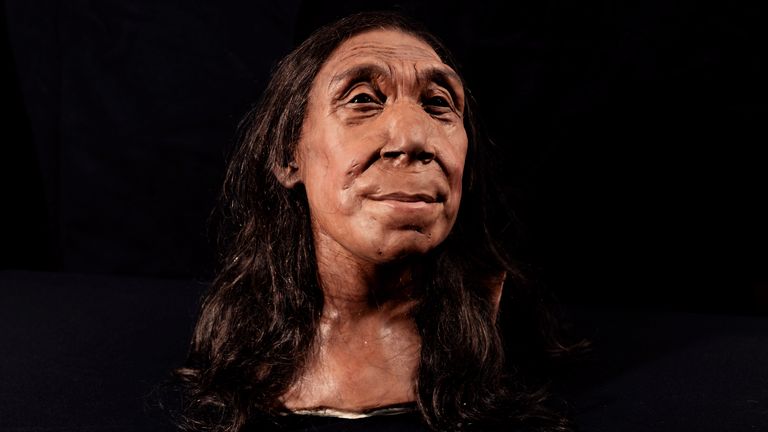Archaeologists have been able to piece together the skull of a 75,000-year-old Neanderthal skeleton.
Researchers from Cambridge University and Liverpool John Moores unearthed the skull at the Shanidar Cave site, 500 miles north of Baghdad, Iraq.
As part of a new Netflix documentary, Secrets of The Neanderthals, they were able to put the skull back together and recreate the face of the woman it once belonged to.
The skull was first found in 2018, where it had been flattened to around two centimetres thick.
It had been crushed, possibly by rockfall, soon after death and compacted further by tens of thousands of years of sediment.
Archaeologists named the skeleton Shanidar Z.
‘High stakes 3D jigsaw puzzle’
To recreate the skull they had to piece together, by hand, more than 200 fragments of bone.
Using sequencing on tooth enamel proteins they were able to determine the skeleton was likely a female.
Her teeth were also used to gauge her age, thought to be in her mid-40s, through examining the levels of wear and tear with some of her front teeth worn down to the root.
Shanidar Z’s physique also suggests they were female, as they stand around five feet tall, and have some of the smallest adult arm bones in Neanderthal fossil records.
Dr Emma Pomeroy, a paleoanthropologist from Cambridge’s Department of Archaeology, described putting Shanidar Z back together as a “high stakes 3D jigsaw puzzle”.
“Each skull fragment is gently cleaned while glue and consolidant are re-added to stabilise the bone, which can be very soft, similar in consistency to a biscuit dunked in tea,” she added.
“A single block can take over a fortnight to process.”
Pollen and food evidence found near remains
The cave where they found Shanidar Z was also home to the remains of 10 other Neanderthals, excavated more than 60 years ago.
Clumps of ancient pollen surround one of the skeletons, something researchers initially suggested indicates the dead were buried with flowers.
However, a study led by Professor Chris Hunt, of Liverpool John Moores University, came to the different conclusion that the pollen was left by bees burrowing into the cave floor.
Further research since Shanidar Z was found detected microscopic evidence of charred food in nearby soil.
Carbonised fragments of wild seeds, nuts and grasses suggest that Neanderthals not only prepared and cooked food, but did so in the presence of their dead.
Dr Pomeroy: “The body of Shanidar Z was within arm’s reach of living individuals cooking with fire and eating.
“For these Neanderthals, there does not appear to be that clear separation between life and death.
“We can see that Neanderthals are coming back to one particular spot to bury their dead.
“This could be decades or even thousands of years apart.
“Is it just a coincidence, or is it intentional, and if so what brings them back?
“As an older female, Shanidar Z would have been a repository of knowledge for her group, and here we are 75,000 years later, learning from her still.”
Reconstructing Shanidar Z
Removing Shanidar Z’s remains posed a difficult problem because of how delicate they were.
Archaeologists used a glue-like consolidant to strengthen the bones and surrounding sediment, before removing Shanidar Z in small foil-wrapped blocks from under seven-and-a-half metres of soil and rock.
Then, in the lab in Cambridge, researchers took micro-CT scans of each block before beginning the slow process of diluting the glue and using the scans to guide the extraction of the bone fragments.
Once the skull had been rebuilt, it was scanned and 3D-printed to form the basis of the reconstructed head.
The reconstruction itself was done by world-leading paleo artists, and identical twins, Adrie and Alfons Kennis, who built up layers of fabricated muscle and skin to create the face.

